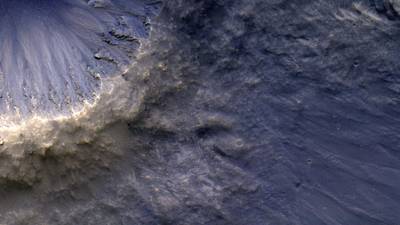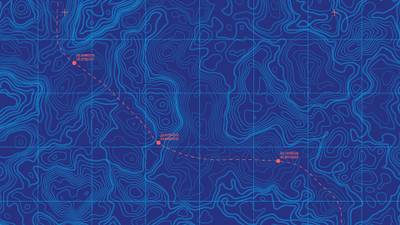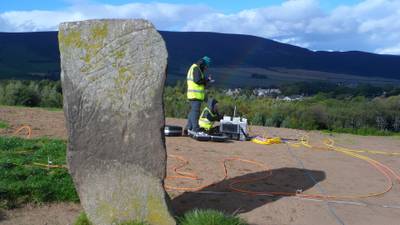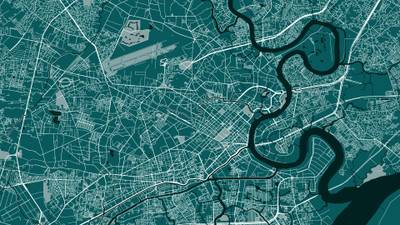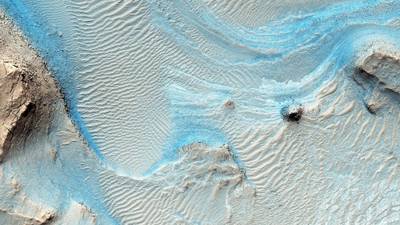Join an Applied Structural Geology course you can study online.
Develop your practical understanding of structural geology.
In this Masters-level online short course, you’ll learn about the tectonic setting of deformation structures, impacts on fluid flow, and the uncertainties inherent in geological interpretation.
With expert guidance, you’ll develop your skills in:
- data manipulation, synthesis, and analysis
- seismic interpretation
- fault-seal analysis
- data integration to build an evolutionary picture of basin development, and
- uncertainty analysis.
Who can join this online structural geology course?
This online course is ideal for those planning a career in, or reskilling for, geoenergy and energy transition technologies, for which structural geology is a key element.
Choose the University of Aberdeen for flexible online short courses

Learn anywhere
On smartphone, desktop and laptop, with no need for a student visa.

Flexible
Flexible hours and 24/7 access, so you can study when it suits you.

20% alumni discount
University of Aberdeen alumni get 20% off fees for this online course.
What you’ll study
In this course, you’ll work through a series of sessions covering the following topics.
Session 1: An introduction to applied structural geology
- Introducing the concept of structural geology
- How and in what contexts structural geology is applied in industry
Session 2: Tectonics and basins
- Introducing large-scale structural settings and styles
- Plate tectonics and how structures form to create the planet we live on
- Structural geology and sedimentology
- Sedimentary basin formation and evolution
Session 3: Stress, faults and brittle failure
- How plate tectonics and the associated forces produce stress in the crust
- Determining fault growth and considering different fault growth models
- How faults interact, create fault populations and determine fault attributes
- How fault attributes determine seismic hazard
Session 4: Normal fault systems
- Examining normal faults in more detail, and their importance for resources
- The role of North Sea fault blocks in trapping resources and wastes
- Domino fault models and the relationship between fault dip and block rotation
- 3D fault arrays
- The role of relay ramps in the distribution of sedimentary facies and fluid-flow
- Practical seismic interpretation exercises
Session 5: Thrust systems
- Challenges of imaging thrust faults in seismic imagery
- How petroleum systems have been explored for in compressional tectonic settings through time
- Fold-thrust systems vs. normal faults
- Interactions with basement faults
- Analysis of thrust faults to understand the evolution of thrust systems
Session 6: Folds and folding
- Folds and different fold-classes
- How fold profiles are constructed
- Interpretation of folds in 3D from satellite imagery
- How well-data is used to construct surface maps of folds
Session 7: Salt tectonics
- The properties that make salt special
- The resulting structures that form in the sub-surface and how these are identified in seismic imagery
Session 8: Strike-slip, oblique and inversion tectonics
- Examining a range of faulting structures that involve more complex deformation
- Linked extension and contraction systems driven by gravitational tectonics
Session 9: Damage, deformation and fluid flow
- The role of fluids in the crust and their role in resource generation
- Examining fault seal in more detail
- Juxtaposition of units across faults, fault properties and reactivation of faults in their role as fluid conduits and barriers
- Fracture systems, veins and mineralisation
Session 10: Models and section construction
- Appropriate concepts to choose for cross-section construction and model building
- How we think about uncertainty in model creation and document assumptions
Session 11: Case studies and reflections
- Examining case studies from different applied structural projects including nuclear waste disposal, mineralisation, and carbon capture and storage
- Reflecting on the skills you have learnt and knowledge acquired
By the end of this structural geology course, you’ll be able to...
-
Manipulate, synthesise, and interpret structural data.
-
Interpret structures that typify the diversity of tectonic regimes and their representation in geophysical imagery, including seismic datasets.
-
Analyse fault systems and determine and record their attributes.
-
Analyse the impact of structures on fluid migration in the subsurface.
-
Integrate diverse geological information to build understanding of structural evolution.
-
Express and appreciate uncertainty in interpretations of structural data.
How you’ll study
Online learning
This distance-learning structural geology course is delivered flexibly, 100% online.
You can learn with us anywhere, no student visa required, and manage your study hours to suit you.
Your teaching
This course is taught at Masters level.
Teaching is delivered through MyAberdeen, our online Virtual Learning Environment (VLE). It holds all the materials, tools and support you’ll need in your studies. Take a look around MyAberdeen.
You can access your learning materials on computer, smartphone and laptop, 24 hours a day. You’ll find a range of online resources available, including:
- videos
- pre-recorded video lectures
- live Q&A sessions
- 3D outcrop models
- audio clips
- slide shows
- quizzes
- reading materials
- online access to our award-winning Sir Duncan Rice Library.
The course integrates outcrop examples with seismic image data, hands-on exercises and experiments, to help you embed your learning and put it into practice with confidence.
Live online sessions
You’ll have two live drop-in Q&A sessions with your tutor in this course, as well as a live wrap-up session for the final course section.
Your tutors
This course is delivered by our School of Geosciences.
You’ll learn from an internationally experienced team of structural geologists with experience in applied research and practical applications of structural geology in industry.
This course is assessed online.
You’ll be assessed throughout your course via quizzes that will allow you to progress through the module.
Ongoing quizzes ensure you’re on track in developing your skills and attaining the learning outcomes.
You’ll then have a final exam online, which will include a mixture of multiple-choice and short-answer questions.
The course totals approximately 150 hours of study and assessment time. That’s around 10 – 15 hours per week.
This is an indicative guide to the time required for a typical student at this level to achieve the learning outcomes. This includes time for independent study, as well as teaching and assessments.
You can largely set your own study hours each week to cover the materials. MyAberdeen is available 24/7, so you can log in and study when it suits you.
Activities at fixed times
There may be some activities scheduled for fixed times. This could include coursework and assessments with deadlines, or online meetings with your tutor. Otherwise, you can access and work through the course at your convenience.
Our first-class support structure will ensure that you aren’t alone in your studies. You’ll have contact with your tutors via MyAberdeen. You can use social media and discussion boards to chat with your fellow students too.
We provide a wide range of services to support you in your studies and beyond:
- Careers and Employability Service
- Disability support
- IT support
- Library support
- Student Support Service – help with finances, wellbeing and non-academic issues
- Student Learning Service – study support, with advice sessions available
- Aberdeen University Students’ Association (AUSA) – run by students for students
- Toolkit – clever apps and free training that can make your study life easier
Wherever you are in the world, you’ll feel part of our very special Aberdeen learning community.
Your teaching team

Professor Clare Bond
Clare is Personal Chair in Geology and Geophysics in our School of Geosciences. She’ll be your course coordinator.
Clare is an Earth Scientist interested in global interactions of Earth processes and people.
Clare’s research activities aim to achieve impact on and accelerate our energy transition to net zero.
View Clare’s profile
Professor Robert Butler
Rob is an Emeritus Professor in our School of Geosciences.
He is a Professor of Tectonics who is active in the Geological Society of London and is on the Board of the Scottish Geology Trust.
Rob’s research focuses on the geology and tectonics of mountain belts and sedimentary basins, especially to understand the distribution and geological context of their earth resources.
View Rob’s profileWhere this will take you
You’ll earn 15 credits at Masters level (SCQF Level 11) when you complete this course successfully. You may be able to use these credits towards further study.
Build your learning
Keep developing your knowledge and skills in geosciences and geology with our growing range of online short courses, including:
Careers in geology
This course is designed to help you develop your undergraduate geology skills to a level that will allow you to undertake applied careers in geology.
The skills and knowledge you’ll gain in this course can help you to progress within or towards roles in:
- mineral exploration
- carbon storage
- geothermal exploitation.
Continuing Professional Development (CPD)
Your employer or professional institute may recognise this course for CPD hours. Talk to your employer or institute to find out more.

Free career support
Access our free careers service while you study.
- 1:1 appointments
- CV checks
- Interview prep
- Job opportunities
Entry requirements
Entry requirements
We welcome students from all over the world.
This course has no formal entry requirements. You do not need to provide proof of your qualifications.
But you do need to check the entry guidance above to understand the level of teaching delivered, to decide if this course is right for you.
If you do not have qualifications from the UK, check the equivalent teaching level for your country.
Visa requirements
You do not need a student visa to study online with us.
English language requirements
Teaching is delivered in English.
You do not have to provide proof of your English language skills to join this course. But we want to make sure that you can use English well enough to study successfully.
Recommended level of English
For this course, we recommend the following level of English language proficiency.
These are our Postgraduate Standard requirements, and these are minimum scores.
IELTS Academic, IELTS UKVI Academic, or IELTS Online (not IELTS Indicator or IELTS General Training)
- 6.5 overall
- 5.5 for listening, reading and speaking
- 6.0 for writing
TOEFL iBT or TOEFL iBT Home Edition
- 90 overall
- 17 for listening
- 18 for reading
- 20 for speaking
- 21 for writing
- TOEFL DI code is 0818
Cambridge English: B2 First, C1 Advanced, or C2 Proficiency
- 176 overall
- 162 for listening, reading and speaking
- 169 for writing
LanguageCert Academic / LanguageCert Academic SELT
- 70 overall
- 60 for listening, reading and speaking
- 65 for writing
Oxford ELLT Digital – English Language Level Test Online
- 7.0 overall
- 5.0 for listening, reading and speaking
- 6.0 for writing
PTE Academic (online test not accepted)
- 62 overall
- 59 for listening, reading, speaking and writing
Skills for English: SELT
- B2 pass with merit
Duolingo – tests taken from 1 July 2024 onward
- 120 overall
- 95 for listening, reading and speaking
- 105 for writing
University of Aberdeen English Pre-sessional Programme (PSE)
- Pass
- Valid for one year. Refresher can be offered if out of date
Pre-sessional academic English preparation programmes undertaken at other UK universities
- Pass at an equivalent of 6.5 (C1)
- B2 in all four skills
- Certification must be within one year prior to the start of your course
For full information about language requirements, see our English Language Requirements page.
You will need access to:
A computer (PC, laptop or Mac) with an up-to-date operating system
Most teaching materials are smartphone- and tablet-friendly. But we recommend a proper laptop or desktop for completing assignments comfortably.
Reliable internet access
We recommend:
- a wired connection
- a minimum download speed of 2 Mbps so you can take part fully in live sessions.
Speakers or headphones
- We recommend a headset with built-in microphone and earphones if you’re likely to study in an environment with background noise.
- A webcam is optional, but you may like to use one for some interactive sessions.
Software
We’ll give you access to Office365 applications. This means you can use online versions of Microsoft Word, Excel, PowerPoint and OneDrive and install these programs on up to five personal devices.
If your course requires specialist software, we’ll provide you with access to this and a licence that lasts throughout your studies.
See our detailed IT requirements for more information.
When you study with us, you can expect a first-class support structure so that you’re never alone in your studies.
But learning online does mean you have to motivate yourself and manage your own time.
Your most important commitment will be time – the time to work through, reflect on and understand your teaching materials.
Before you start a course that involves a high degree of independent study, we recommend looking at the time you will be able to devote to your studies each week:
- Be realistic
- Create a weekly schedule as a guide
If you have any questions about studying online, get in touch with our friendly team. We’re here to help.
Fee payment
Your course fee needs to be paid in full before you start your course.
We accept payment via Visa Debit, Visa Credit and Mastercard.
Ways to save
You may be able to get help funding this course via:
- discounts – if any discounts are available for this course, they’ll appear in the section below
- employer sponsorship – we accept full and partial fee payments from sponsors.
Find out more about funding options.
Student card
All our students are entitled to a University of Aberdeen student card. This gives you access to a range of student discounts around the city and online.
Learning resources
Access to all the essential books and resources you need are included in your tuition fee. They’ll be made available to you online and you do not have to buy your own copies.
We also provide optional recommended reading lists. Many of these resources are available electronically through our library, although purchases may be required if you wish to read the full list.
Printing
You may want to set aside a small budget for printing, depending on how you like to work.
This course has no formal entry requirements. You decide if it’s suitable for you.
Knowledge of structural geology
To succeed on this course, you should be familiar with fundamentals in structural geology, as would be found in most first degrees in Earth Science.
The course is delivered at Masters level, and you should have at least:
- a 2:2 UK honours degree (or equivalent) in a relevant subject, or
- relevant professional experience that supports this level of teaching.





